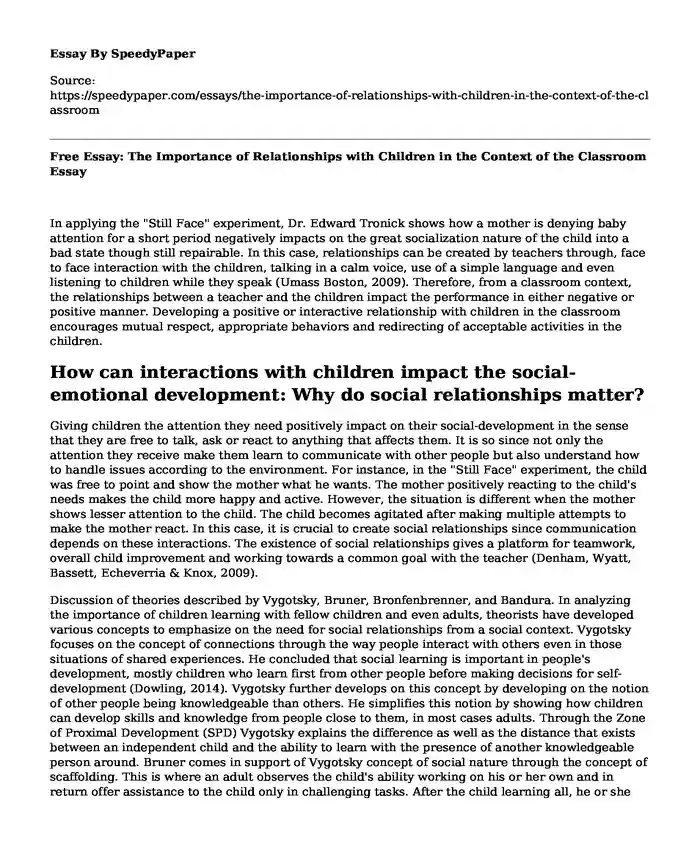
| Type of paper: | Course work |
| Categories: | Teaching Pedagogy Relationship |
| Pages: | 3 |
| Wordcount: | 802 words |
In applying the "Still Face" experiment, Dr. Edward Tronick shows how a mother is denying baby attention for a short period negatively impacts on the great socialization nature of the child into a bad state though still repairable. In this case, relationships can be created by teachers through, face to face interaction with the children, talking in a calm voice, use of a simple language and even listening to children while they speak (Umass Boston, 2009). Therefore, from a classroom context, the relationships between a teacher and the children impact the performance in either negative or positive manner. Developing a positive or interactive relationship with children in the classroom encourages mutual respect, appropriate behaviors and redirecting of acceptable activities in the children.
How can interactions with children impact the social-emotional development: Why do social relationships matter?
Giving children the attention they need positively impact on their social-development in the sense that they are free to talk, ask or react to anything that affects them. It is so since not only the attention they receive make them learn to communicate with other people but also understand how to handle issues according to the environment. For instance, in the "Still Face" experiment, the child was free to point and show the mother what he wants. The mother positively reacting to the child's needs makes the child more happy and active. However, the situation is different when the mother shows lesser attention to the child. The child becomes agitated after making multiple attempts to make the mother react. In this case, it is crucial to create social relationships since communication depends on these interactions. The existence of social relationships gives a platform for teamwork, overall child improvement and working towards a common goal with the teacher (Denham, Wyatt, Bassett, Echeverria & Knox, 2009).
Discussion of theories described by Vygotsky, Bruner, Bronfenbrenner, and Bandura. In analyzing the importance of children learning with fellow children and even adults, theorists have developed various concepts to emphasize on the need for social relationships from a social context. Vygotsky focuses on the concept of connections through the way people interact with others even in those situations of shared experiences. He concluded that social learning is important in people's development, mostly children who learn first from other people before making decisions for self-development (Dowling, 2014). Vygotsky further develops on this concept by developing on the notion of other people being knowledgeable than others. He simplifies this notion by showing how children can develop skills and knowledge from people close to them, in most cases adults. Through the Zone of Proximal Development (SPD) Vygotsky explains the difference as well as the distance that exists between an independent child and the ability to learn with the presence of another knowledgeable person around. Bruner comes in support of Vygotsky concept of social nature through the concept of scaffolding. This is where an adult observes the child's ability working on his or her own and in return offer assistance to the child only in challenging tasks. After the child learning all, he or she can in handling the difficult task, the adults withdraw the support leaving the child to become independent and more so competent. Brunner further acknowledges parents as positively contributing to the cognitive development of children every day through playing. Similar to Vygotsky and Brunner, Bronfenbrenner shows that children do not develop on their own but instead learn from environmental systems that positively develop their social growth (Dowling, 2014). To Bronfenbrenner, the microsystem is vital in covering the child's innermost circle like relationships with family, friends, teachers and even other people in school or any social setting. Through these microsystems, the child can link together places or experiences and thus develop social learning in any given location. In short, Bronfenbrenner argues that a child's development highly depends on the experiences and values of family members as well as the society that influence social development. On the other hand, Bandura emphasizes on the need of having a role model in developing a child's social nature. To this theorist, a child learning from other children can adopt negative behaviors such as being aggressive and anti-social. Having a good role model means appealing results on the child's social development since he or she will be motivated into differentiating what is right and wrong. In this case, Bandura emphasizes the need to teach children right morals through consistent use of examples from day to day experiences (Dowling, 2014).
References
Umass Boston. (2009, November 30). Still Face Experiment: Dr. Edward Tronick [YouTube]. Retrieved from https://www.youtube.com/watch?v=apzXGEbZht0
Denham, S. A., Wyatt, T. M., Bassett, H. H., Echeverria, D., & Knox, S. S. (2009). Assessing social-emotional development in children from a longitudinal perspective. Journal of Epidemiology & Community Health, 63 (Suppl 1), i37-i52.
Dowling, M. (2014). Young children's personal, social and emotional development. Sage.
Cite this page
Free Essay: The Importance of Relationships with Children in the Context of the Classroom. (2022, Apr 11). Retrieved from https://speedypaper.com/essays/the-importance-of-relationships-with-children-in-the-context-of-the-classroom
Request Removal
If you are the original author of this essay and no longer wish to have it published on the SpeedyPaper website, please click below to request its removal:
- Free Essay Example on FIFA Corruption
- Law Essay Sample: Legal Systems in Africa
- Free Essay in American History: Expansion, War and Reconstruction
- Free Essay Sample on Economic Elasticity of Demand
- Transportation Management System
- Free Essay: Comparison of Personality Theories and Analysis of Your Own Personality
- Founders' Son: A Life of Abraham Lincoln Review. Essay Sample
Popular categories




